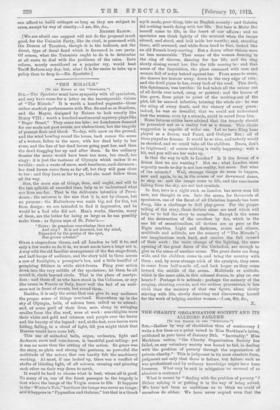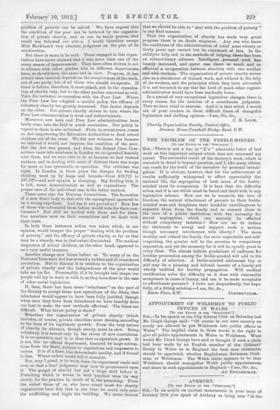THE CHARITY ORGANIZATION SOCIETY AND ITS ALLEGED FAILURE.
[To TRH EDITOR OF THE " SFECTATOR."] SIR,—Ratber by way of elucidation than of controversy I write a few lines on a point raised in Miss Markhanfe letter, published in your iseue of .1:armory 20th. "Inevitably," Miss Markham writes, "the Charity Organization Society has failed, as any voluntary society was bound to fail, in dealing with the problem of poverty through the organization of private charity." This is judgment in its most absolute form, judgment nob only that there is failure, but failure such as was predestined and by ordinary knowledge might have been foreseen. What may be said in mitigation or reversal of so absolute a sentence P
What is meant by "dealing with the problem of poverty "P Either solving it or putting it in the way of being solved. We have not been so ambitious as to think we could of ourselves do either. We have never argued even that the problem of poverty can be twirl)/ We have argued that the condition of the poor can be bettered by the organiza- tion of private charity, and, as can be fairly proven, that result has followed our a.ctiGn. I would therefore escape Miss Markham's very absolute judgment on the plea of its misdirection.
But there is more to be said. Those engaged in this organ-
ization have 'never claimed that it was more than one of the many means of improvement. They have often striven to act in alliance with other parties who in different departments have, or should have, the same end in view. Progress, it has
always been insisted, depends on the completeness of the work, not of one party, but of all those who should co-operate. If there is failure, therefore, it must attach, not to the organiza- tion of charity only, but to the other parties concerned as well.
Take, for instance, co-operation with the Poor Law. Where the Poor Law has adopted a careful policy the efficacy of voluntary charity has greatly increased. One factor depends on the other. But private charity strives in vain where the Poor Law administration is weak and indiscriminate.
Moreover, new laws and Poor Law administrations have lately conic into the field in quick succession. Our policy in regard to them is also criticised. First, in recent years, comes an Act empowering the Education Authorities to feed school children out of the rates. We did not welcome this because we believed it would not improve the condition of the poor. But the Act was passed, and when the School Care om- inittees came into existence in London we co-operated heartily with them, and we were able to do so because we had trained workers, and in dealing with cases of distress there was scope for more or less systematic co-operation. Our criticism was right. In London in three years the charges for feeding children went up by leaps and bounds—from £19,721 to a7,627—and now opinion is changing. Big feeding bills, it is felt, mean demoralization as well as expenditure. The proper care of the individual case is the better method.
There came also the Distress Committees. The formation of a new State body to deal with the unemployed appeared to us a wrong expedient. And has it not proved so P How few of those who advocated them before would vote for their con- tinuance ? But still we worked with them and for them. Our members were on their committees and we dealt with their cases.
In both these instances action was taken which, in our opinion, would hamper the proper "dealing with the problem of poverty," and the efficacy of private charity, so far as that may be a remedy, was to that extent diminished. The medical inspection of school children, on the other hand, appeared to us a very useful measure.
Another change now looms before us. To many of us the National Insurance Act has seemed a sudden and ill-considered revolution. But to discuss it in relation to the organization of private charity and the independence of the poor would take me too far. Presumably, if it be brought into shape, our people will try to work in with it, as they have done in the case of other social legislation.
If, then, there has been some "reluctance" on the part of the Society to accept these new operations of the State, that reluctance would appear to have been fully justified, though when once they have been introduced we have heartily done our best to make the new methods effectual. The times are difficult. What better policy is there ?
Meantime the organization of private charity (which includes, of course, private charities) must develop according to the lines of its legitimate growth. From the very nature of charity its advance, though steedy, must be slow. Being voluntary, it is moved only by the stress of new convictions. It is co-operative, and it is thus that co-operation grows. It is not, like an official department, financed by large subven- tions from the State, subject to regulations and responsive to orders. It is of a finer, less determinate quality, and if forced it dies. Where orders would fail it succeeds.
Nor, may I plead, is its work done, its experiment made and over, so that a final judgment may now be pronounced upon yet a large field before it. it. The gospel of charity has Preaching which is woven in with practice wins its way slowly, for the practice is, much of it, the preaching. From the outset those of us who have cared most for charity ,organization have felt that in our time we could only raise the scaffolding and begin the building. We never dreamt that we should be able to "deal with the problem of poverty" in any final manner.
That the organization of charity has made very great progress there is no doubt whatever. Any one who knew the conditions of the administration of relief some twenty or thirty years ago cannot but be convinced of this. In thc. ability to help and in the methods of helping there Las beeiz an extraordinary advance. Intelligent personal work has largely increased, and never was there so much and so effectual a co-operation between charities with one another and with workers. The organization of private charity serves- also as a storehouse of trained work, and without it, the help of its workers, and the principles which they have advocated, it is not too much to say that the level of much other cognate: administration would have been markedly lower.
In a period of very exceptional legislative changes there is every reason for the exercise of a considerate judgment. That we have tried to exercise. And it is that which I would ask of your readers in these difficult times of changefut, legislation and shifting opinion.—I am, Sir, &c.,
C. S. Loc. Charity Organization Society, Central Office, Denison House,Vaucehall Bridge Road, S. W.











































 Previous page
Previous page